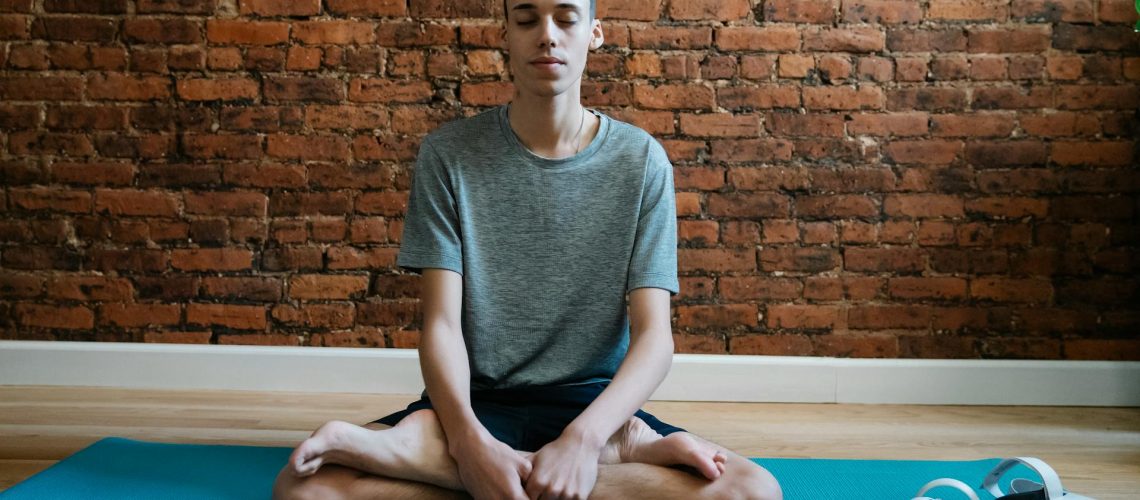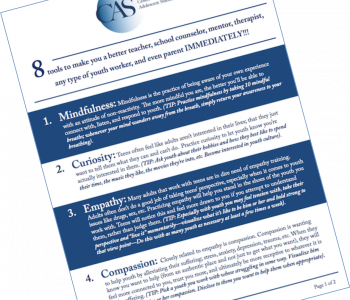

Catharine Hannay, MA
Catharine Hannay is the founder of MindfulTeachers.org and the author of Being You: A Girl’s Guide to Mindfulness, a workbook for teen girls on mindfulness, compassion, and self-acceptance.
A Dozen Yoga and Mindful Movement Videos for Teens
Here are a variety of yoga, movement, and stretching videos for use by teachers, therapists, and anyone else who’d like to share grounding, relaxation, and awareness practices with youth.
1) Afro Flow Yoga Relaxation
instructor: Leslie Salmon Jones, who combines yoga with African-inspired dance (accompanied by live music from her husband Jeff W. Jones)
level: should be suitable for all levels: breathing exercises followed by gentle movement for the arms and shoulders
time: 4 minutes
equipment: none
2) Beginner Yoga for Bigger Bodies
instructor: Zelinda Yañez, a yoga teacher and yoga therapist who specializes in adapting instruction to different body types.
level: Standing and seated routine suitable for less flexible participants.
time: 15 minutes
equipment: 1-2 folding chairs to modify some of the poses
3) Beginner Yoga Routine for Men
instructor: Yoga and Pilates instructor Sean Vigue
level: enough strength and flexibility to handle a typical yoga class
time: 10 minutes
equipment: mat
4) 5 Mindful Movement Practices for Youth
instructor: Em Morrison from the Mindful Schools teacher certification program
level: gentle movement; should be suitable for all levels of fitness
time: 9 minutes (the movements are demonstrated from minutes 2-7, followed by a demonstration of a game that can be played with a group.)
equipment: none for the movement practice; you’ll need a quarter (or equivalent type of coin) to play the game
(note: This video explains the movements to instructors; it’s not intended as a routine to be shown to your students or clients.)
5) Mindful Movement Refresh
instructor: Mind-body educator Cara Bradley
level: beginning/gentle movement
time: 5 minutes
equipment: none
6) Rise and Shine Yoga Class
instructor: 14-year-old(!) yoga teacher Jaysea Devoe
level: teens with the strength and flexibility to handle a typical adult yoga class
time: 30 minutes
equipment: mat
7) Seated Yoga for Teens and Kids
instructor: Pediatric physical therapist Heather Sossaman (movements demonstrated by a teen boy)
level: kids who can handle upper-body twisting and stretching movements
time: 5 minutes (video is 7:24; movements start at 1:36)
equipment: chair
8) Wheelchair Yoga
instructor: Ben Clark from Adapt to Perform (‘Fitness for wheelchair users, by wheelchair users.’)
level: average upper-body strength and range of motion; enough hand and arm strength to lift leg into position for seated pigeon pose
time: 15 minutes
equipment: wheelchair (or chair)
9) Yoga for Beginners Teen Yoga Class
instructor: Yoga Ed (instructor not named)
level: average level of fitness and flexibility
time: 20 minutes of movement + 5 minutes of meditation
equipment: mat
10) Yoga for Complete Beginners
instructor: “Black Yogi” Nico Marie
level: average level of fitness and flexibility
time: 20 minutes
equipment: mat and pillow or folded towel
11) Yoga for Energy and Stress Relief
instructor: Yoga teacher Rodney Yee
level: enough strength and flexibility to handle a typical yoga class
time: 5 minutes
equipment: mat
12) Yoga for Teens
instructor: Yoga teacher Adriene Mishler
level: enough strength and flexibility to handle a typical yoga class
time: 20 minutes
equipment: mat
Conclusion
I hope you and your students, patients, or clients find these practices helpful.
Please keep in mind:
- What makes movement ‘mindful’ has little to do with the specific type of movement you choose—it’s about how they’re paying attention to their own breath, their own bodies, and their own internal experience.
- Even something labeled as a beginner video may not be suitable to the fitness level of any particular teen. Please preview (and ideally, try yourself) any of the videos you plan to use—and think carefully about what’s most appropriate for the specific youth under your care.
- It’s very important that they learn to listen to signals from their own bodies, rather than pushing too hard to imitate the instructor or their peers (which could lead to frustration and even injury).
Join the FREE Resilience Community for Helping Professionals to learn more about trauma-informed care, resilience, mindfulness, building relationships, and more! Our community features self-paced courses, a monthly live Zoom call, a weekly live meditation, and an online platform to connect with other providers/professionals in your field.
Related Posts
A Dozen Videos for Teaching Mindfulness to Teens
Five Mindfulness Activities for Each of the Five Senses
Ten Essential Guidelines for Teaching Meditation to Trauma-Impacted Youth

